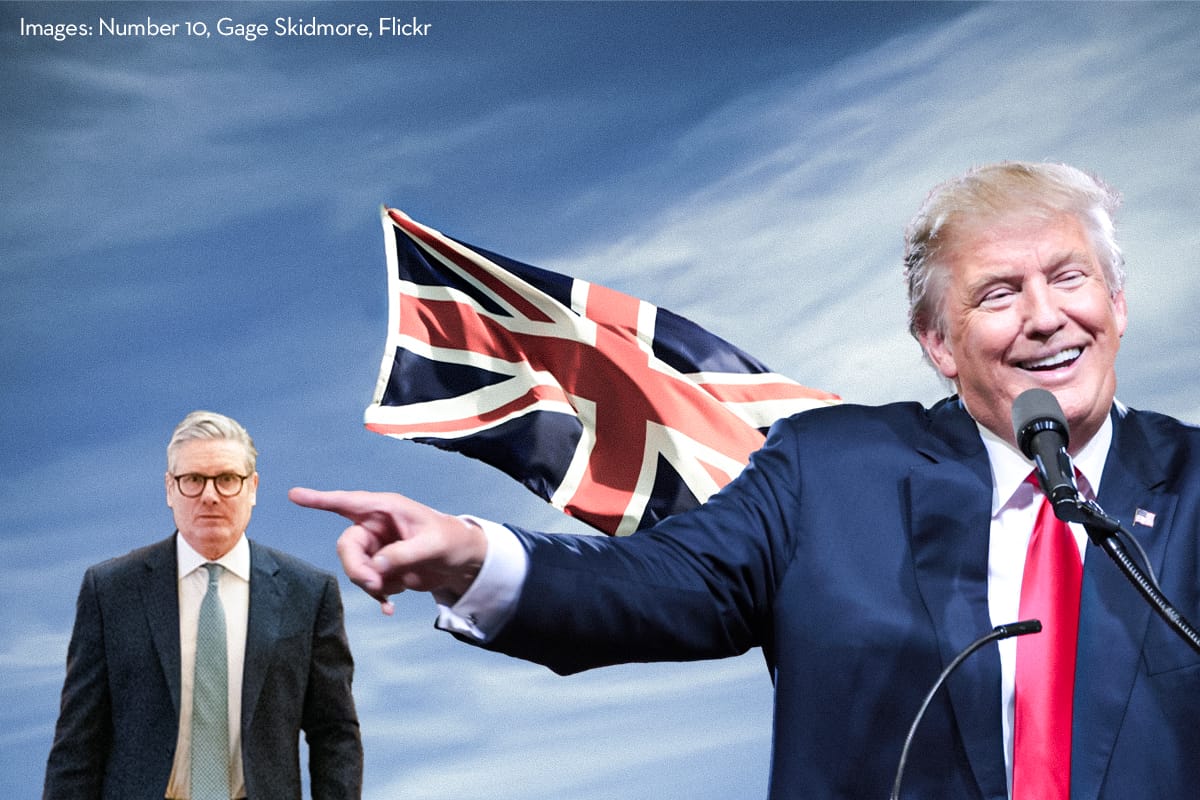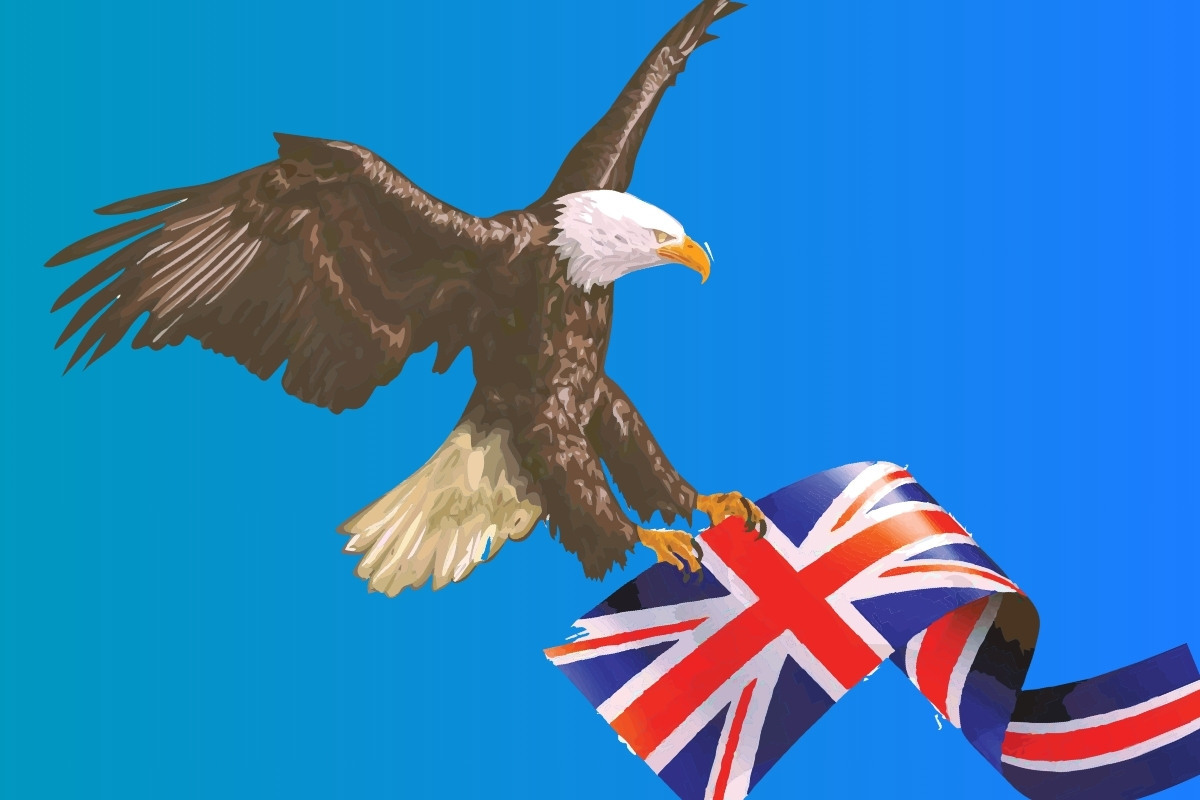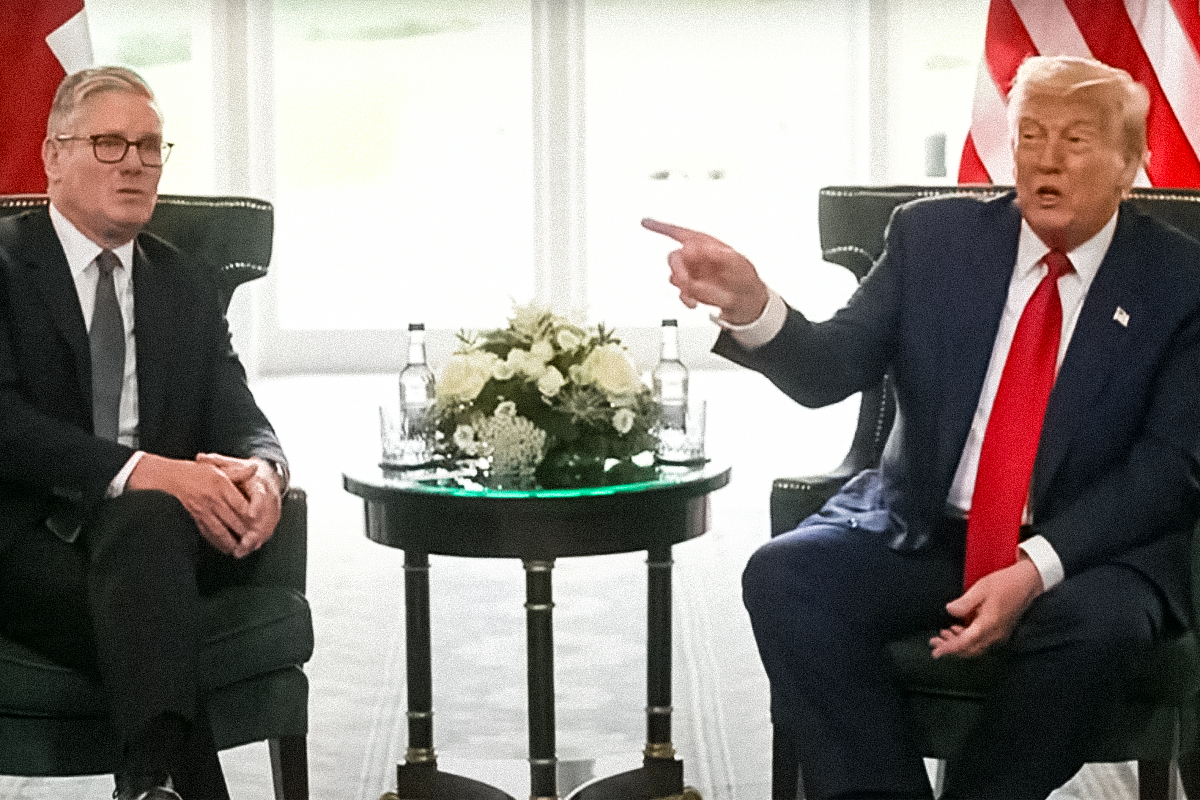From 25-29 July, Donald Trump visited Scotland on a ‘private visit’. Much of his time was spent playing golf, as he was there to open his third golf resort in the country.
Making sure that they fit around his golf schedule, Trump received a number of diplomatic visitors, all keen to win the favour of the man in the White House.
First up was Scottish First Minister John Swinney, who offered £180,000 of public funds to Trump’s new resort so that it can host a golf tournament next month.
Next was EU Commission president Ursula von der Leyen, who agreed to a trade deal in which the US would impose 15 percent tariffs on most EU imports.
Also included was a promise that the EU would spend hundreds of billions of dollars on US energy and weapons. In return, the US won’t carry out its threat of imposing 30 percent tariffs.
A lucrative and prestigious golf tournament and a one-sided trade deal with the EU: a solid start to Trump’s holiday.
Having finished his entrées, Trump was ready for the main course. Enter Keir Starmer.
“He’s a friend of mine”

Standing upon the steps of his opulent new golf course, Trump embraced Starmer and his wife. Greeted as a visitor in his own country, Starmer’s subservience to his Washington master was clear from the outset.
What followed was an hour and a half of emasculation for Sir Starmer, who sat there mostly in silence – being described by The Telegraph as a “prop” with a “thousand yard stare” – as the US President shared his thoughts on an array of topics.
It is clear that Trump had an axe to grind with his British quisling – opining on everything from wind turbines, described as “ugly monsters”; to Starmer’s controversial farmers’ inheritance tax; to the ‘Online Safety Bill’, where Trump warned Starmer not to “censor Truth Social”.
The President did not pull any punches. When asked if he would visit London, Trump went on a tirade against its Labour mayor, Sadiq Khan. “I’m not a fan of your mayor. I think he’s done a terrible job,” he said, “a nasty person, I think.”
Attempting to preserve a scrap of dignity, Starmer interjected, “he’s a friend of mine”. After reiterating his thoughts on the London mayor, Trump then went on to remind Starmer that “Nigel [Farage], as you know, is a friend of mine.”
To Starmer, who is being consistently trounced in the opinion polls by Farage’s Reform UK, the message from Trump was read loud and clear. He did not challenge the President again.
On the subject of Farage, Trump even gave Starmer some tips if he wants to beat Reform in the next election, saying that he needs to “slash taxes and stamp out illegal immigration”.
“I don’t mind him taking a position”
Things got more humiliating for Starmer when the two got to the topic of foreign affairs.
On the question of the Ukraine War, the British government report of the meeting says that “the leaders agreed that they must maintain momentum to bring about an end to the war with Russia”.
What actually happened is that Trump, with no regard for Starmer, took it as an opportunity to vent his frustrations with Putin. He announced that his original 50 day deadline for a ceasefire had been cut to 10-12 days, with extra sanctions threatened.
Starmer sat silently, listening to his boss speak.
Next up was Palestine. Both leaders – who have fully backed the genocide in Gaza – spoke hypocritically about the famine (which again, they have facilitated) and their aims to bring food in.
Discussing the question of recognising Palestinian statehood, Starmer made a characteristic blunder. On whether or not Britain should make such a move, Trump seemingly gave Starmer permission: “I don’t mind him taking a position.”
The next day (29 July), Starmer announced plans to recognise Palestinian statehood sometime in September, unless a ceasefire is reached.
Sticking to his proven track record, Starmer misread the orders coming from the President, and got a bit carried away.
Despite clearly being a cynical manoeuvre to wash Britain’s hands of Palestinian blood, Starmer’s announcement incurred the wrath of his American master.
Trump publicly denounced Starmer’s decision, accusing him of “rewarding Hamas”. As with any lapdog that gets ideas above its station, Trump gave Starmer a good kick.
The President parted ways with Starmer with one final gift: he let him have a ride in the presidential helicopter! The British press has fawned over this move as a “rare honour”, last given to David Cameron (because his broke down).
“It’s better than other days”

This is the stark reality of the so-called ‘special relationship’.
With the global crisis of capitalism, and the relative decline of US imperialism, there is a shifting balance of forces between the world powers.
Trump, both a product and an accelerant of this process, has subsequently declared a trade war on the world, unleashing a new wave of tariffs at the time of writing.
Compounding this, Britain is already in the midst of its own long-term decline, going from an empire that ‘ruled the waves’ to a lickspittle of its former colony, the USA. This is what underlies the loathsome display of brown-nosing carried out by Starmer.
Desperate to avoid further tariffs, and to cling on to Britain’s relationship with the US, Trump could have insulted Starmer’s own mother and he would have sat there smiling.
Cut adrift from the EU following Brexit, laden with debts, and eager to please investors, Starmer will do whatever he can to get thrown a bone by his ‘good friends’ across the Atlantic.
Back home, this means an agenda of cuts, privatisations, militarism, and further attacks on the working class, in a desperate attempt to make Britain attractive to foreign investment, and to stay in the good books of the occupants of the Oval Office.
On the other side there is the working class, which is increasingly sick of the entire system, and is desperately looking for an alternative. For Starmer, whose fortunes are hitched to those of British capitalism, all roads lead to ruin.
This has been the case for many decades. But the recent fracturing of world relations has accentuated British capitalism’s hapless position.
What separates Trump from previous US presidents, however, is that he forgoes many of the diplomatic niceties, and says the quiet part out loud.
Hence his bouts of diplomacy were squeezed around his golf games. He even gave Starmer golf tips, advising that: “Even if you play badly, it’s still good. If you had a bad day on the golf course, it’s OK. It’s better than other days.”
Was this advice from one beleaguered leader to another? Or perhaps he mistook Starmer for a caddie.






